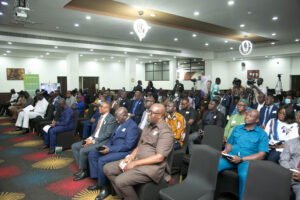Communications and Digitalisation Minister Ursula Owusu-Ekuful has sent a strong warning to public officials; that beginning next year the use of personal emails for official government business will no longer be permitted.
Announcing the directive, she said government has partnered with Microsoft and E Solutions, its local partner, to roll-out the Smart Workplace platform – the virtual office for government workers which provides the needed tools for staff communication, collaboration and meetings without participants being in the same space.
“With all these tools available, I am happy to announce that the use of personal emails for government business will no longer be permitted by end of this year. Any government agency that has not yet been on-boarded should contact NITA to be on-boarded before close of the year. Please let me repeat: it will not be acceptable to use personal emails to do official government business from next year,” she stated.
She further warned that any public official who insists on using his or her private email in conducting government business will outrightly lose his or her job.
The move, according to her, is aimed at protecting the country’s security as well as institutional memories.

“By the end of this year, all organisations working in the public and civil service should be on the SMART workplace platform to use the secure email services that are on there. For the CEOs and public service officers, as we are writing it into the business processes in the public service, if you don’t use the secure email services you could use lose your job because you are compromising security of the entire organisation’s data. And, we can’t allow individuals to put our entire systems at risk,” Mrs. Owusu-Ekuful stated.
She was speaking at a Technology Breakfast Meeting organised the National Information Technology Agency (NITA) in collaboration with the State Interests and Governance Authority (SIGA) and Office of the Head of Civil Service (OHCS).
“If we didn’t have the systems in place to be able to facilitate this, then we could have been edgy. But, we can comfortably thump our chest and say that NITA is in a position to ensure every public sector official has an official email to do their business so that official information stays within the official domain,” she added.
She said the public sector ICT ecosystem must have the right architecture, security protocols, business continuity set-up, maintenance culture and operate according to best international practices; and users and managers of the system must be guided by standards and specified operating protocols to minimise risks such as cyber-attacks, data loss, breaches and leakages, system outages and the like.
“You Chief Directors and CEOs present here today are key stakeholders in achieving a digital public sector, and by extension a digital Ghana. Your leadership and support in driving the needed reforms that come with introduction and use of digital initiatives is key. You will have to lead by example and set the right tone for your staff to understand and appreciate the reforms being rolled out,” she stated.
The technology breakfast meeting
A two-day event organised by NITA in collaboration with SIGA and OHCS, the meeting brought together key stakeholders and decision-makers in the Digital Ghana Agenda.
The event’s objectives were to: introduce decision-makers within the public service to highlights of Ghana’s Digitalisation agenda; get the decision-makers to appreciate their layer of the digitalisation framework and the role they play in its realisation; re-introduce the Smart Workplace TM (Government Virtual Office) to the executives, and adoption-strategies to ensure their institutions are on boarded and utilising the Smart Workplace; and the cessation of using private emails for government business.
Addressing the executives, Director General of NITA, Richard Okyere-Fosu, said the country’s efforts to digitalise its economy have come a long way with some good success stories to share – adding that government has thus far invested over US$500million and continues to invest in the effort to digitalise this economy.
“Most of this investment by government is to provide the needed infrastructure and enabling environment that provides the basic and needed framework to allow all other sectors within the public sector to also digitalise or automate the delivery of their mandate,” he stated.
“It is therefore important as public sector executives for us to know and align with what government has already done, what government is doing, and what government plans to do in the area of digitalisation,” he added.
This, according to him, will ensure that state agencies avoid duplication of resources and efforts, but rather consolidate, optimise their initiatives within the technology space, and deploy interoperable technologies which can communicate with existing and future systems.
“It is also our duty to lead the adoption of ICT in our various institutions to promote transparency, accountability, efficiency and improved productivity. Furthermore, we will have to provide the needed leadership by leading the change management process in efforts to digitalise the public sector,” he stated.

Time to be technology-driven
On his part, the Director-General of SIGA, Ambassador Edward Boateng, said with Ghana at the forefront of digitalisation in Africa, it has become increasing important that state owned enterprises work smart to become more efficient and productive.
“There is a need to employ technology to reduce waiting times, offer a more effective customer service experience, and enhance service delivery,” he stated.

He said SIGA in partnership with NITA is driving this agenda, and urged all specified entities to come on board with them in this journey as there will be the introduction of a digitalisation KPI into the Annual Performance Contract.
“SIGA and NITA are ever-ready to provide consultancy services to entities that need to set up their Information Technology Platforms to get started,” he stated.










